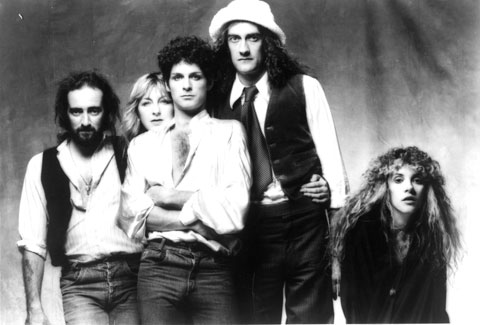
UNCOMPROMISING! Trucks tries to fathom the “anti-Rumours” by mimicking Lindsey Buckingham’s peculiar mix of self-indulgence and artistic commitment. |
It would be nice to think that my 1980s schoolboy aversion to Fleetwood Mac came down to a rigorous training in F.R. Leavis's elevation of "the concrete" over the sentimental. Or solidarity with punk's (revolutionist? puritanical? you decide!) guerrilla war against the bloat of '70s rock. But in fact, like a good teenage authoritarian, I laughed at Morrissey's hearing aid, thought Human League were out of tune, and was, quite frankly, freaked out by early dance music. Iron Maiden made perfect sense, though, as did the UK's Wrathchild. Go figure.
As Rob Trucks reminds us in his new 33 1/3 book, after 1977's Rumours, it was de rigueur, outside Middle America, to scorn Fleetwood Mac: they practically invented FM radio, their sound seemed at odds with a world increasingly in (oil) crisis, and they represented the triumph of gossip over Seriousness and Art. It's all the more surprising, then, to learn that Fleetwood Mac's follow-up album is equally suspicious of Rumours. For Rob Trucks, the word that best defines Tusk (1979) is "uncompromising." Lindsey Buckingham's anti-Rumours, it's marked by "the new-wave, possibly punk, late-1970's muse he had just discovered." In short, the album is art rather than commerce or excess. The irony, Trucks well observes, is that only such a "decadent" rock band could've got the go-ahead for the venture.
In Tusk 33 1/3, Trucks tries to fathom this strange double album. To do so, he — I think — mimics Buckingham's peculiar mix of self-indulgence and artistic commitment. As a result, he warns at the start, "There's a good chance you won't like this book." And if you're not sure what he's getting at, he adds, "In fact, there's a really, really good chance that you won't like this book." That second "really" — in its dizzyingly plain-talking redundancy — is, well, soTusk. Thanks, Rob!
There's a lot here of Buckingham repeating his no-compromise ethos. And there's a good deal of Trucks recounting what was going on his own life at the record's release. Buckingham is made to sound like a windbag, and Trucks's autobiography gives you a chance to skim. It's as though — like a new kind of Bach — he were syncopating the slow grandeur of the music with the swiftness of modern prose. . . . No, of course, he doesn't. The personal anecdotes are just a snooze.
If Buckingham and Trucks are — there's no other word for it, I'm afraid — bores, is the book a failure? Absolutely not. Trucks's innovations on the 33 1/3 form are interesting, even if you don't actually want to read them. More important, he appears to be a skillful interviewer. He gets some fine comments out of Jonathan Segel of Camper Van Beethoven (a band who released a full re-creation of Tusk), AC Newman, Avey Tare, a woman in the marching band on the song "Tusk," a Fleetwood Mac tribute band, and — the highlight — two of the guys from Wolf Parade. It's these last who are worth the cover price on their own. Ignore Trucks's attempts to shoehorn himself into the interview with (uncompromising? self-parodying? zzzzzzzzzz . . . ) asides like "Bakara, by the way, was a lit major, and obviously went to a much better school than Rob did." The pair praise Buckingham's songwriting and guitar playing with expert voices. They remark that "his songs . . . [are] completely alien and angular and empty. They're cold, in a way. But there's this big emotion in his voice." They're right about Tusk's "massive claustrophobia." It's an intriguing and bewildering album, and Trucks's flawed book is a heroic attempt to capture it.